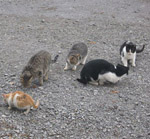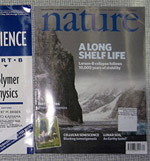Rising ocean temperatures promotes dominance of exotic species
 Tunicate colonies of Botrylloides violaceus, a non-native species in Bodega Harbor. Credit, Dann Blackwood, USGS.A new study from Northern California finds direct evidence that warming oceans leads to increased dominance of non-native species in coastal marine areas.
Tunicate colonies of Botrylloides violaceus, a non-native species in Bodega Harbor. Credit, Dann Blackwood, USGS.A new study from Northern California finds direct evidence that warming oceans leads to increased dominance of non-native species in coastal marine areas.
Cascade Sorte and fellow researchers conducted an experiment on the marine organisms that colonize hard surfaces like docks, boat hulls, and natural substrata (i.e the fouling community) around Bodega Harbor.
They collected a number of native and exotic species - including bryzoans, turnicates, and hydroids - and subjected the organisms to different water temperature levels in a laboratory setting.
The researchers found that higher temperatures hinder native species by reducing survival rates. At the same time, higher temperatures help non-native species by increasing growth rates.
The researchers created a model to explain how the combination of survival and growth rates might influence community composition under warming ocean temperature.
Based on the model, they predicted that as increases approach +4.5 C, the abundance of the most common native species Distaplia occidentalis decreases 74% while the non-native species Diplosoma listerianum, Botrylloides violaceus, and Bugula neritina increase by 4%, 5%, and 19%, respectively.
The study results provide evidence that warming temperatures might be at least partially responsible for the rising dominance of invasive species in the fouling community of Bodega Harbor.
"Non-natives currently represent 67% of the nine most common local species compared to only 33% almost 40 years ago," the authors note.
Increased propagule pressure from boats transporting exotic species is likely partially to blame. However the study findings suggest +1 C increase in water temperature in Bodega Harbor during that time period may also be responsible.
This study is groundbreaking because it represents one of the first studies to demonstrate the impact of warming temperatures on native and exotic marine species independent of propagule pressure from ships.
Past research has suggested that increased dominance of fouling communities by non-native species could lead to changes in "filtering rates and water quality, fish species diversity and abundance, and competition with farmed shellfish."
--Reviewed by Rob Goldstein
Sorte, C., Williams, S., & Zerebecki, R. (2010). Ocean warming increases threat of invasive species in a marine fouling community Ecology DOI: 10.1890/10-0238




 Invasive
Invasive
Reader Comments